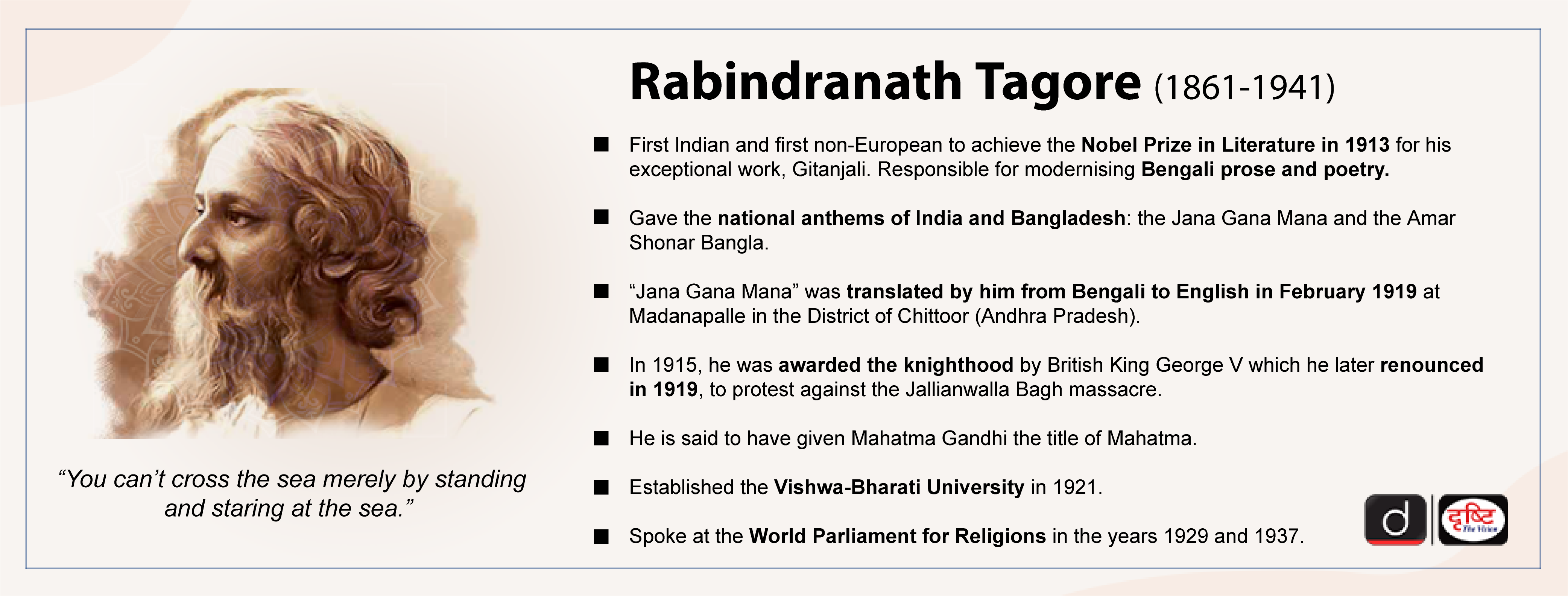Important Facts For Prelims
Rabindranath Tagore
- 09 May 2022
- 5 min read
Why in News?
The Prime Minister on 9th May, 2022 paid tribute to Gurudev Rabindranath Tagore on his birth anniversary.
- According to the Bengali calendar, the Tagore Jayanti falls on the 25th day of the Boishakh month.
What do we know about Rabindranath Tagore?
- Birth:
- He was born in Calcutta on 7th May 1861.
- About:
- He was also referred to as ‘Gurudev’, ‘Kabiguru’, and ‘Biswakabi’.
- He is regarded as the outstanding creative artist of modern India and hailed by W.B Yeats, Rabindranath Tagore was a Bengali poet, novelist, and painter, who was highly influential in introducing Indian culture to the west.
- He was an exceptional literary figure and a renowned polymath who singlehandedly reshaped the region's literature and music.
- He was a good friend of Mahatma Gandhi and is said to have given him the title of Mahatma.
- He had always stressed that unity in diversity is the only possible way for India’s national integration.
- He had spoken at the World Parliament for Religions in the years 1929 and 1937.
- Contributions:
- He is said to have composed over 2000 songs and his songs and music are called ‘Rabindra Sangeet’ with its own distinct lyrical and fluid style.
- He is responsible for modernising Bengali prose and poetry. His notable works include Gitanjali, Ghare-Baire, Gora, Manasi, Balaka, Sonar Tori, He is also remembered for his song ‘Ekla Chalo Re’.
- He published his first poems aged 16 under the pen-name ‘Bhanusimha’.
- He not only gave the national anthems for two countries, India and Bangladesh, but also inspired a Ceylonese student of his, to pen and compose the national anthem of Sri Lanka.
- Besides all his literary achievements he was also a philosopher and educationist who in 1921 established the Vishwa-Bharati University, a university that challenged conventional education.
- Awards:
- In 1913 he was awarded the Nobel Prize in Literature for his work on Gitanjali.
- He was the first non-European to receive the Nobel Prize.
- In 1915 he was awarded knighthood by the British King George V. In 1919, following the Jallianwalla Bagh massacre, he renounced his Knighthood.
- In 1913 he was awarded the Nobel Prize in Literature for his work on Gitanjali.
- Death:
- He died on 7th August 1941 in Calcutta.
- Quotes by him:
- “You can’t cross the sea merely by standing and staring at the sea.”
- “Don’t limit the child to your own learning, for he was born in another time.”
- “If I can’t make it through one door, I’ll go through another door- or I’ll make a door. Something terrific will come no matter how dark the present.”
- “Facts are many, but the truth is one”.
UPSC Civil Services Examination, Previous Year Questions
Q. With reference to Madanapalle of Andhra Pradesh, which one of the following statements is correct?
(a) Pingali Venkayya designed the tricolour Indian National Flag here.
(b) Pattabhi Sitaramaiah led the Quit India Movement of Andhra region from here.
(c) Rabindranath Tagore translated the National Anthem from Bengali to English here.
(d) Madame Blavatsky and Colonel Olcott set up headquarters of Theosophical Society first here.
Ans: (c)
- The original song ‘Jana Gana Mana’ (National Anthem) was written in Bengali, but in a Sanskritized dialect known as Sadhu Bhasha.
- The idea of translating the song from Bengali to English came to Rabindranath Tagore while he was visiting the Besant Theosophical College on the invitation of Irish poet James H. Cousins. He penned down the English translation during his stay at Madanapalle, a small town in the Chittoor district of Andhra Pradesh.
- Jana Gana Mana was officially proclaimed as India’s National Anthem by the Constituent Assembly of India on 24th January 24, 1950.
- Therefore, option (c) is the correct answer.







